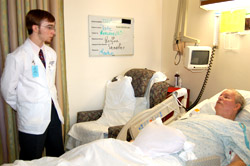Tyler Merchant said he has known since kindergarten that he wanted to be a doctor.
And except for two recent days of doubt when he was struggling with a class, the Washington University junior has not changed his mind.

What got Merchant through those days of doubt and solidified his decision to become a doctor was spending time with patients at Barnes-Jewish Hospital through the Health-Care Advocacy Program offered by the School of Medicine’s Office of Diversity Programs.
The year-old Health Care Advocacy Program gives WUSTL freshmen and sophomores the opportunity to explore the health-care setting as part of an eight-week patient care unit assignment at Barnes-Jewish Hospital.
“We felt that we had a well-developed program for high schoolers interested in a health career, as well as our medical school and residency programs,” said Will Ross, M.D., associate dean for diversity and assistant professor of medicine. “But we wanted a program dedicated to undergraduates. We wanted to take our best pre-med students and give them clinical experience, and perhaps enourage them to stay with us for medical school. We also had a larger goal of promoting cultural competence.”
Ross and Lisa Stevenson, director of diversity programs, developed a novel program in which a student is paired with a patient and commits to at least five hours a week.
“The student becomes their patient’s advocate,” Ross said. “Working closely with the nursing staff, they are actively engaged in patient-care management. They are there to listen and to explain things that the patient does not understand. Hopefully, the patient will then feel more empowered and engaged.”
Last year seven students participated in the program. To be considered, pre-medical freshmen or sophomores must have grade point averages of 3.0 or higher. Students from groups traditionally under represented in medicine or from disadvantaged backgrounds are encouraged to apply. At the end of the program, students submit a journal and a paper on their experience as a patient advocate, attend a debriefing session and complete an evaluation form.
Ross and Stevenson eventually would like to expand the program, potentially opening it to other universities. Ten to 12 students will participate in 2007.
Merchant said the hospital staff and physicians have been very receptive to him.
“Patients are much more than a bundle of signs and symptoms,” he said. “They carry baggage with them, their family and backgrounds. You need to know if they have recently lost a loved one or are in an economic crisis. Just being a good listener helps. Confidentiality is crucial.”
Ross said spending time with patients should help the students appreciate their rich diversity and backgrounds.
“Simply placing students in the hospital will not necessarily make them more sensitive and compassionate,” he said. “But by becoming their patient’s advocate, they really get to know their patients and understand their needs.”